Dyson OnTrac vs Apple AirPods Max: how do these premium wireless headphones compare?
Is Dyson OnTrac to beat Apple?
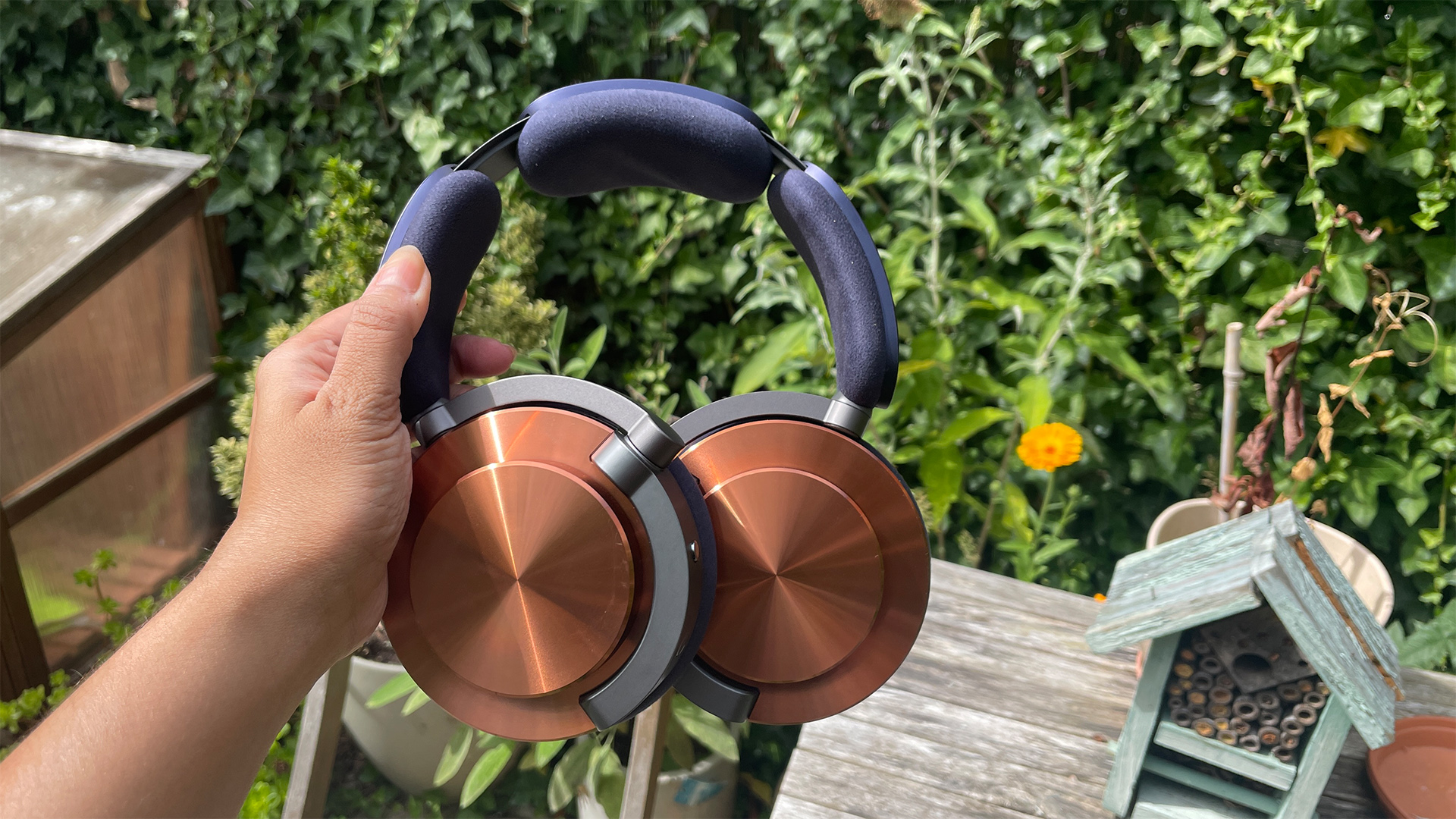
Bluetooth: 5.0
Codec support: SBC, AAC, LHDC
Battery life: 55hrs
Active noise-cancelling: Yes
Weight: 451g
This section of the wireless headphone market is probably the most competitive, so as a new entrant, Dyson always had its work cut out. The OnTrac are well built, with a marathon battery life and impressive ANC, but they're too bulky, they make your ears hot and they just don't sound good enough to compete with the likes of the AirPods Max. For this money, we expect better.
For
- Clear, detailed, with even balance
- Mature, neutral tone
- Customisable design is interactive and fun
- Comfortable
- Effective ANC
- Outstanding battery life
Against
- Sound lacks dynamic punch and subtlety
- Could do with better timing and more enthusiasm
- Oversized ear cushions get too hot
- Usability isn’t flawless
- Some premium features missing
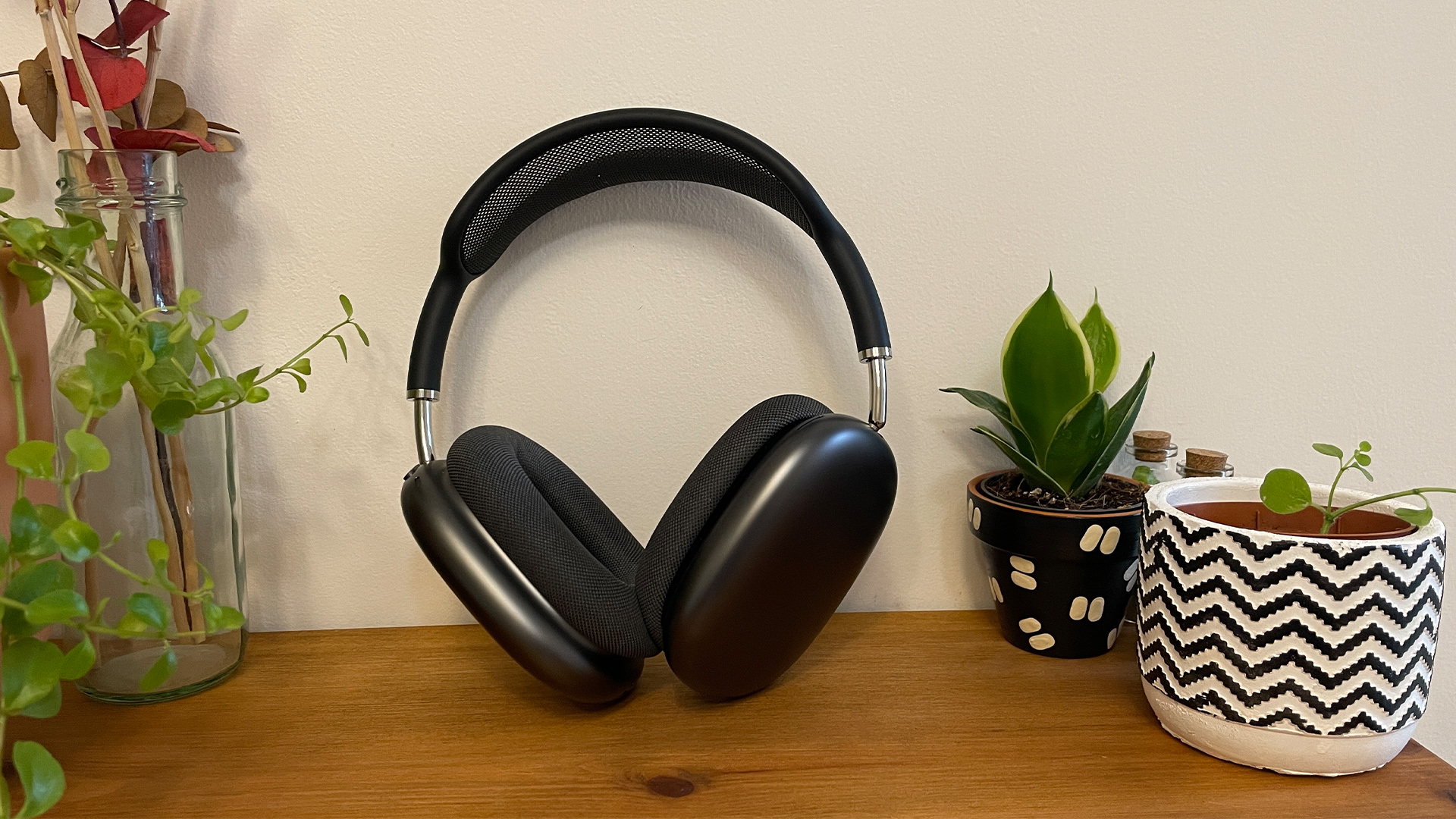
Bluetooth: 5.0
Codec support: SBC, AAC
Battery life: 20hrs
Active noise-cancelling: Yes
Weight: 385g
The AirPods Max are still sitting pretty, four years after launching. Their build quality remains unsurpassed for the money, they're bursting with features (for iOS users, anyway), and they sound superb. Their ANC remains very good too. And while they're certainly not cheap, the price has been coming down of late. The clear winner.
For
- Superb audio and noise-cancelling
- Cinematic spatial audio
- Exceptional build quality
Against
- Near-pointless case
- Audio cable not included
- Practically Apple-only
Noise-cancelling headphones are the celebrity fragrances of the consumer tech world – everyone's having a go. How hard can it be, right? Get some half-decent sonics, whack in some active noise cancellation (ANC), and watch the money roll in. But as Sonos recently discovered, even a brand with a portfolio rich in excellent speakers has to work hard to compete with the best wireless cans on the market.
Now it's Dyson's turn. This isn't the suction emporium's first pop – though its debut, the Dyson Zone, was more conspicuous for its air purification properties than its noise cancelling or sound quality chops. But it is still a gamble. And with a price tag of £449 / $500, they're firmly in Apple AirPods Max territory. Tough competition indeed.
So which will emerge as the Chris Hemsworth-fronted Boss For Men, and which the The Only Way is Essex: Be Reem eau de toilette? Let's pit Dyson against Apple and see which comes out on top.
Dyson OnTrac vs AirPods Max: price
Coming in at this end of the market takes some chutzpah, but then Dyson's devices are never cheap. The £449 / $500 / AU$799 pricing puts the OnTrac up there with some of the best premium headphones – that's pricier than the Sony WH-1000XM5, the same price as the Bose QuietComfort Ultra Headphones, and slightly cheaper than the AirPods Max (£549 / $549 / AU$899).
The AirPods Max have been around for nearly four years now though (they launched at the end of 2020), which makes discounts more common. They often drop to £499, and have even gone as low as £399, which makes them more accessible.
** Winner: Dyson OnTrac **
Dyson OnTrac vs AirPods Max: design
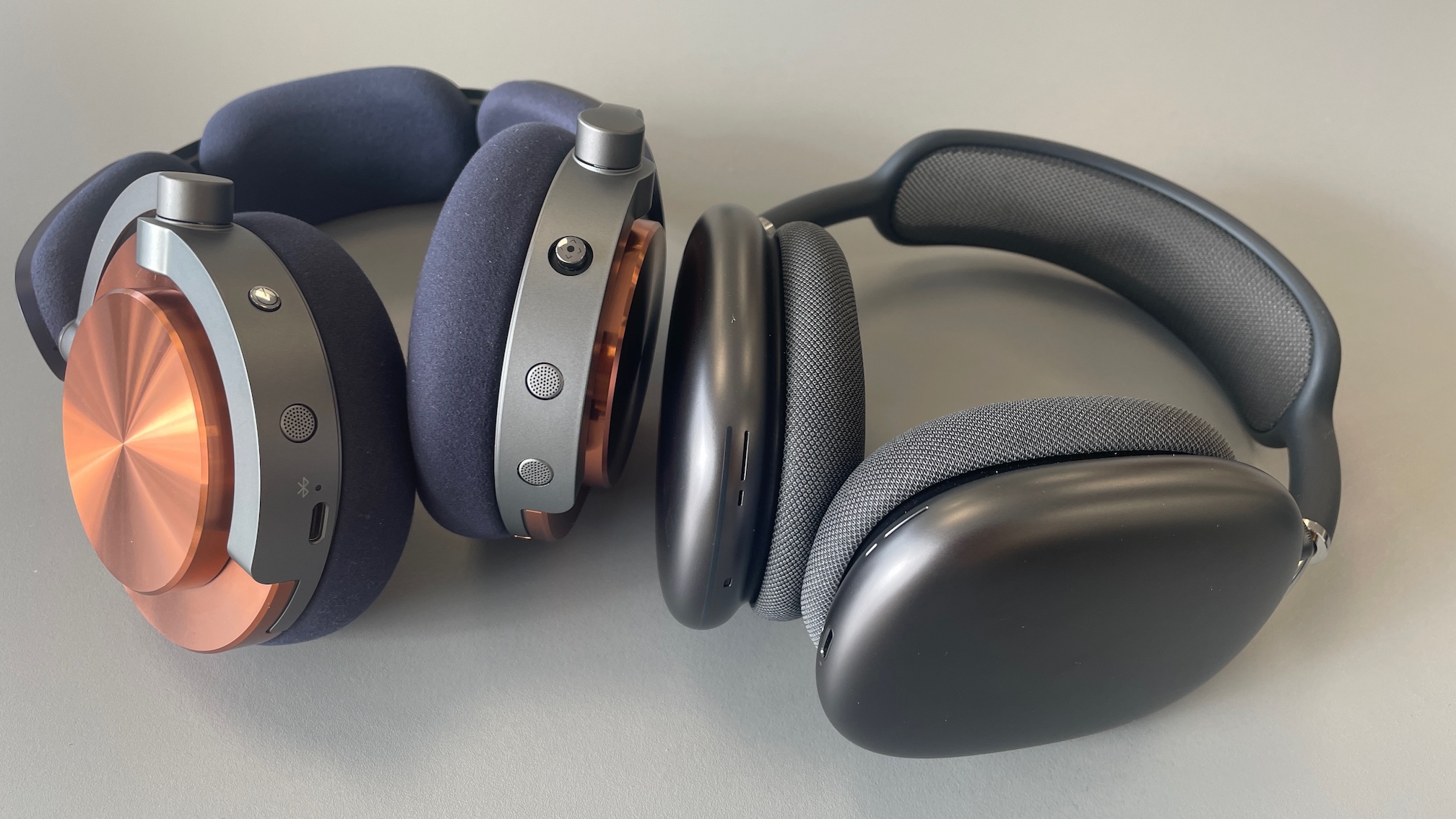
The Dyson OnTrac's USP is that you can swap out both the inner ear cushions and outer ear caps, with a range of bold colour options at your disposal. You can even mix and match if you like, though obviously each new set will cost extra – £50 per set.
Dyson's parts swap out with a twist-lock system, which makes it really easy, and it all fits together seamlessly with no gaps. And it's fun, providing the kind of interaction you don't usually get with a pair of cans. It makes them look a bit Meccano, but some people really won't mind that, especially those of us itching to unleash our inner tinkerer.
The OnTrac are pretty chunky and don't feel quite as seamlessly luxurious as the AirPods Max. But they feel nicely robust, like their hinges and headband will withstand plenty of flex, and they're not too heavy. Their weight distribution is helped by the fact that the two battery cells are in the headband. That means less cushioning than some pairs, but they're still comfortable during short listens.
Longer listening sessions pose more of a problem, however. They made our ears hot. Really hot. Not just while walking around on a sweltering day, but while sitting at a desk in an air-conditioned office. They're also considerably heavier than the AirPods Max, and even with that clever weight distribution, you'll notice that you're wearing them. They're chunky too, so much so that you can't wear them around your neck without finding your chin engulfed by an earcup.
The Dyson's protective carry case is also far superior to the AirPods Max's – though that's not hard. It's collapsible, so is easier to store when not in use, and covers more of the headphones than the AirPods Max's (which has been compared to a bra, and not in a good way). It has a gap so you can still charge the headphones via USB-C without removing the case.
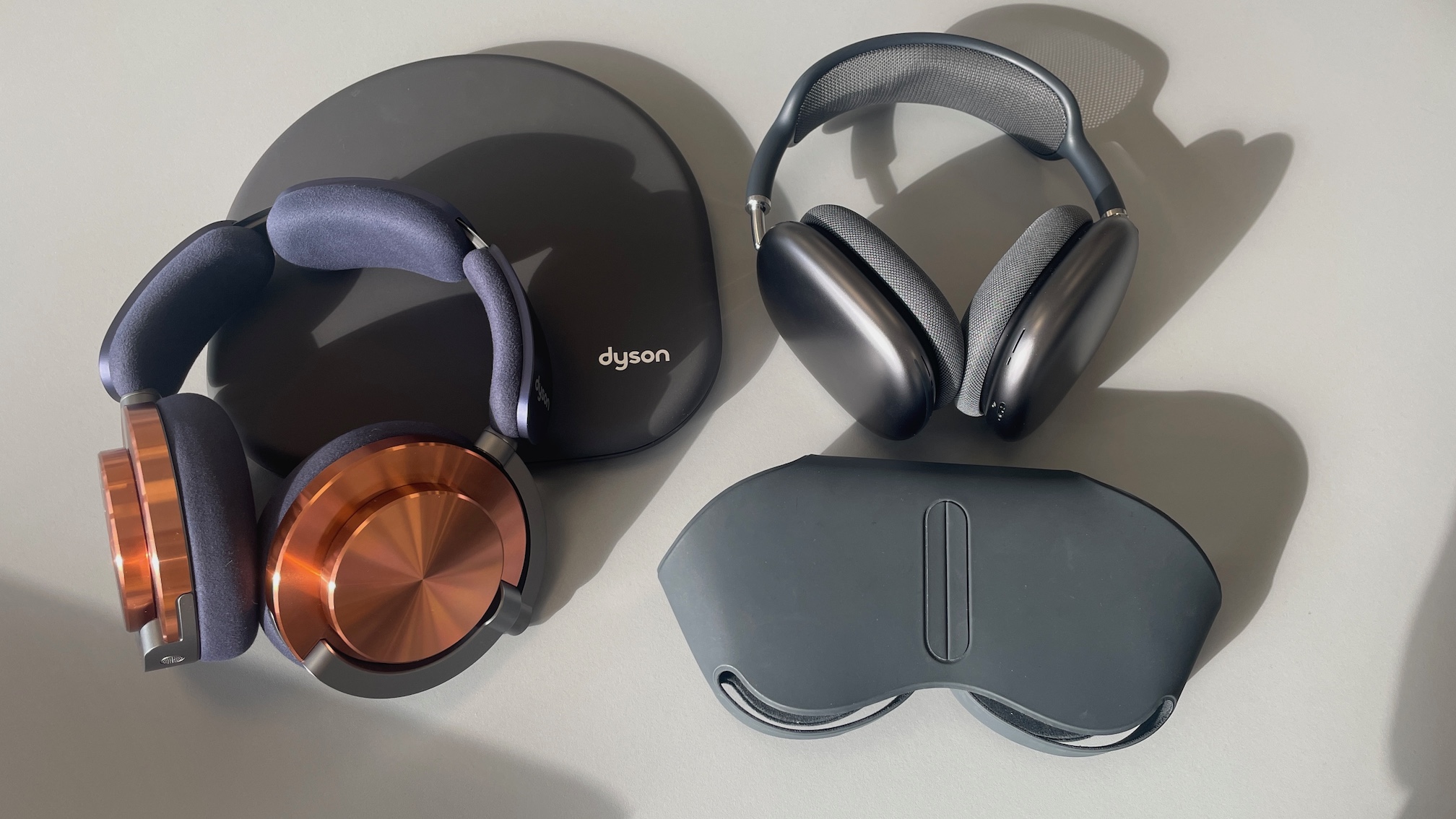
Such is their build quality, the AirPods Max make most other headphones look cheap (though comparably, most are). Their pristinely machined, single-piece anodised aluminium ear cups, stainless-steel headband and memory foam ear cushions are the thing of boutique hotels and first-class airport lounges. It's easy to see why they feature in so many glossy magazine supplements. You also get the choice of five finishes, though they're subtler than the OnTrac's bright options.
They're heavy, at 385g, though they carry it well, remaining comfortable enough to wear for hours on end. Two physical controls – a button for switching ANC modes, and a "Digital Crown" rotary dial – are a joy to use, whereas we found the OnTrac's touch-sensitive ANC controls a little tricky to operate. The OnTrac also have physical buttons for music playback and summoning a voice assistant, but they're not as intuitive as Apple's interface.
** Winner: Apple AirPods Max **
Dyson OnTrac vs AirPods Max: features
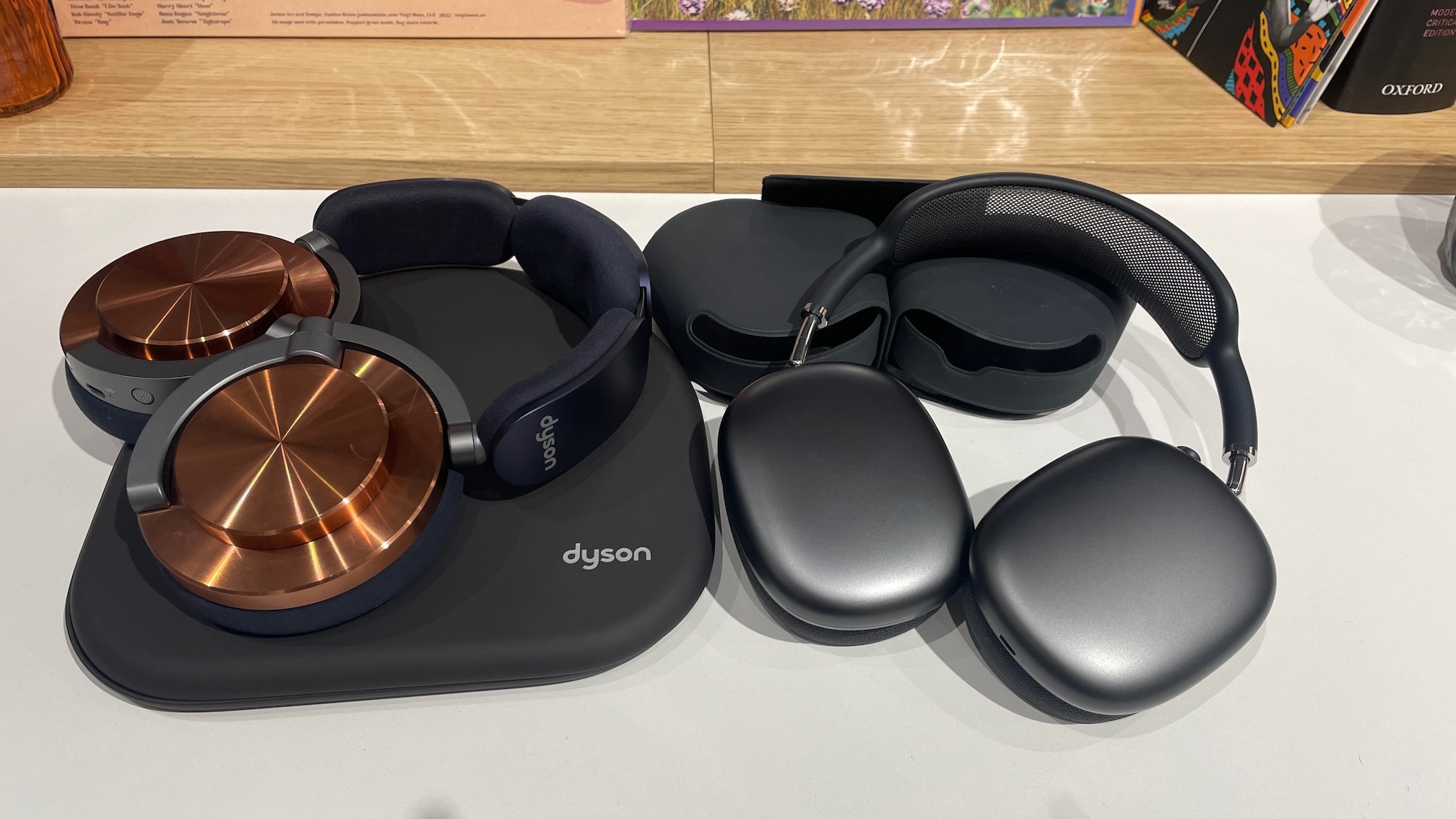
The AirPods Max are a well-specced pair, but their 20-hour battery life is a bit disappointing, especially in the face of the Dyson OnTrac's marathon 55 hours (both are with ANC on). That's not quite market-leading (that honour goes to the Sennheiser Momentum Wireless 4), but still very impressive.
The AirPods Max can work wired as well as wireless, but you'll have to buy a cable and it's not a solution to listening with a dead battery – the AirPods still need some juice to work in even a wired capacity. Each earcup boasts an H1 chip, and eight microphones are dotted around the headphones to enable noise cancellation and dynamically adjust the sound to your surroundings and ear seal in real-time. Apple's own 40mm driver features a dual neodymium ring magnet motor which, Apple claims, allows the AirPods Max to maintain total harmonic distortion of less than one per cent across the entire audible range.
There are other features too, but some – like Apple Spatial Audio – are only for iOS users.
The Dyson OnTrac also have eight mics for hybrid noise cancellation, and a Transparency mode for feeding in outside noise – handy for hearing station announcements, or ordering a drink when you hear your train is delayed. Dyson claims the mics monitor external noise 384,000 times per second to make ANC adjustments on the fly, and two beamforming mics should also make for clearer voice calls. The OnTrac also feature 40mm neodymium drivers and the larger ear cushions aim to offer a greater element of passive isolation too.
They support the SBC and AAC Bluetooth codecs by default, as well as the 24-bit LHDC codec. But they're a bit lacking the features department – there's no spatial audio, no customising the controls or adjusting the ANC / transparency modes, and no Bluetooth multipoint for seamlessly switching between wireless devices (the AirPods Max also lack this, but have their own feature that does the same thing though only with Apple devices). The Dysons do have head detection though, which automatically pauses / plays music when you take the headphones off / put them back on again. And it works very well.
The OnTrac are controlled via the MyDyson app, which has been going for years. It's well laid out, and lets you intuitively change ANC modes and choose equaliser presets. One unique feature is the real-time “sound exposure” graph, which monitors the amount of in-ear and external noise you’re hearing when wearing the OnTrac, and displays any sudden or harmful peaks in sound levels.
** Winner: Apple AirPods Max **
Dyson OnTrac vs AirPods Max: sound
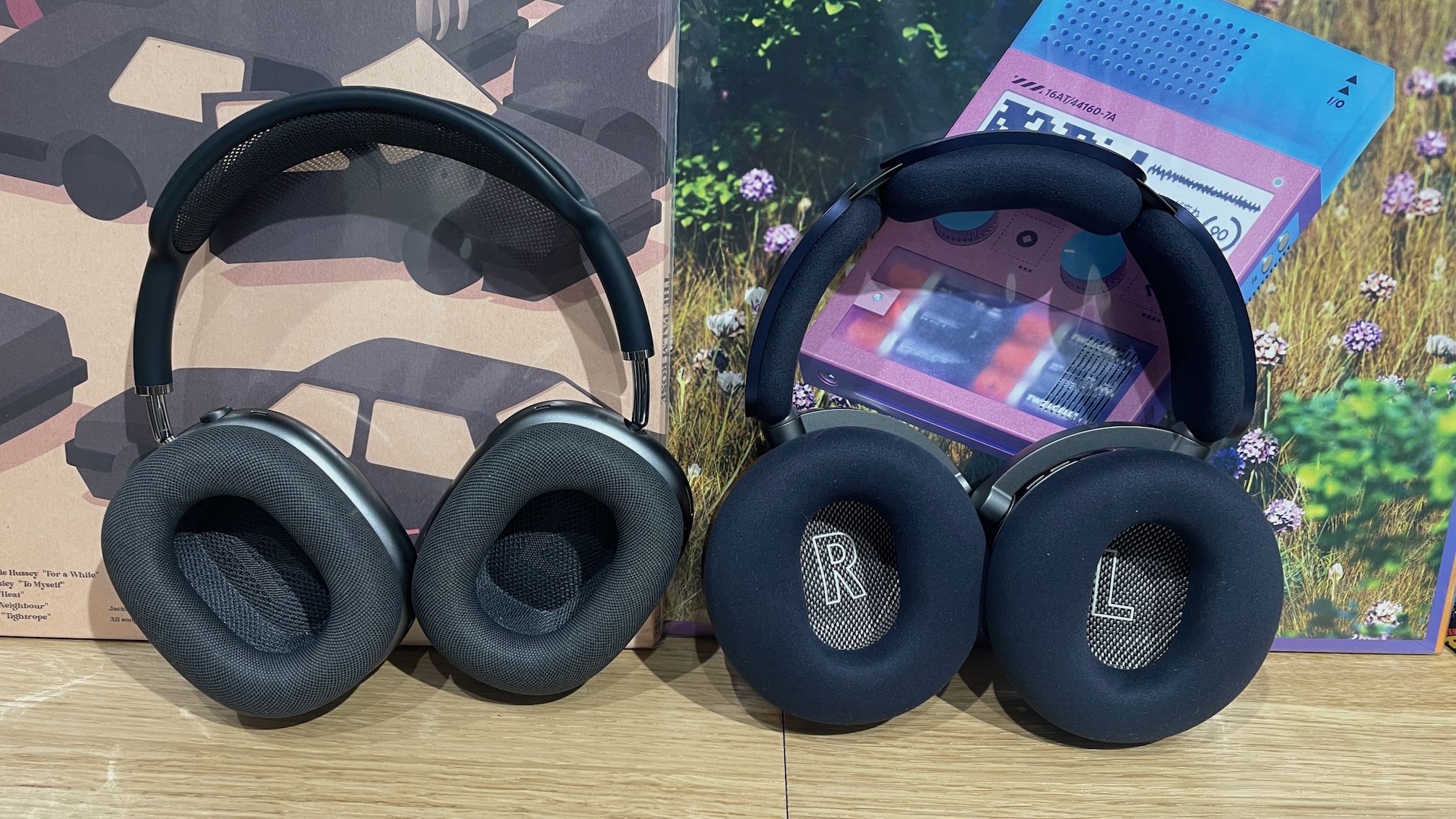
We can forgive a lot if a pair of headphones sound fantastic, but sadly the Dyson OnTrac do not.
It's not all bad. Their ANC is very good indeed, especially for a first effort. It's highly effective without veering into the 'vacuum-like' effect of some pairs. And the Transparency mode works a treat.
Sound is clear and clean, with a neatly organised and evenly balanced presentation, but it's just a bit boring for our tastes. They surface a lot of detail, but not nearly as much low-end power as the AirPods Max. There's a lack of dynamic punch and subtlety overall, and the AirPods Max carry more authority and nuance.
In nearly four years, the AirPods Max haven't disappointed. The noise cancellation is excellent (though bettered elsewhere, such as with the Bose QC Ultra Headphones), but to hear them at their best you need to switch off both ANC and Transparency mode. They sound crisp and spacious, with bundles of clarity and energy. And the amount of precision and texture they generate makes recordings that bit more engaging.
The treble is superb, and the organisation is such that presentations never become muddled, no matter how busy they are. Apple Spatial Audio is a treat for visual content, especially as it 'locks' the audio in place so it sounds like it's coming from the screen, even if you turn your head. But of course, you'll need to be an iOS user to feel the benefit, not only of this feature, but of the AirPods Max as a whole.
** Winner: Apple AirPods Max **
Dyson OnTrac vs AirPods Max: verdict
The AirPods Max prove a hurdle too great for the suction specialists. Apple's cans are beautifully built, intuitive to use, and sound very good indeed, still standing tall after four years to compete against newcomers. And they're not even the best wireless headphones around at this premium price. The fact they have been discounted to be cheaper than the OnTrac in the past might also give Dyson a few sleepless nights.
We like the Dyson OnTrac's design, especially the customisation options and app, but some usability issues, a bulky build and the key metric of sound quality all let them down. Even Android users would probably be better served by the AirPods Max.
MORE:
AirPods Max 2: all the rumours worth hearing
The best noise-cancelling headphones money can buy
Get your learn on: How noise cancellation works
Get the What Hi-Fi? Newsletter
The latest hi-fi, home cinema and tech news, reviews, buying advice and deals, direct to your inbox.
Joe has been writing about tech for 20 years, first on staff at T3 magazine, then in a freelance capacity for Stuff, The Sunday Times Travel Magazine (now defunct), Men's Health, GQ, The Mirror, Trusted Reviews, TechRadar and many more. His specialities include all things mobile, headphones and speakers that he can't justifying spending money on.
-
camcroft Reply
What when you turn them on. The end of ear wax as we know it.Jasonovich said:It sucks!

